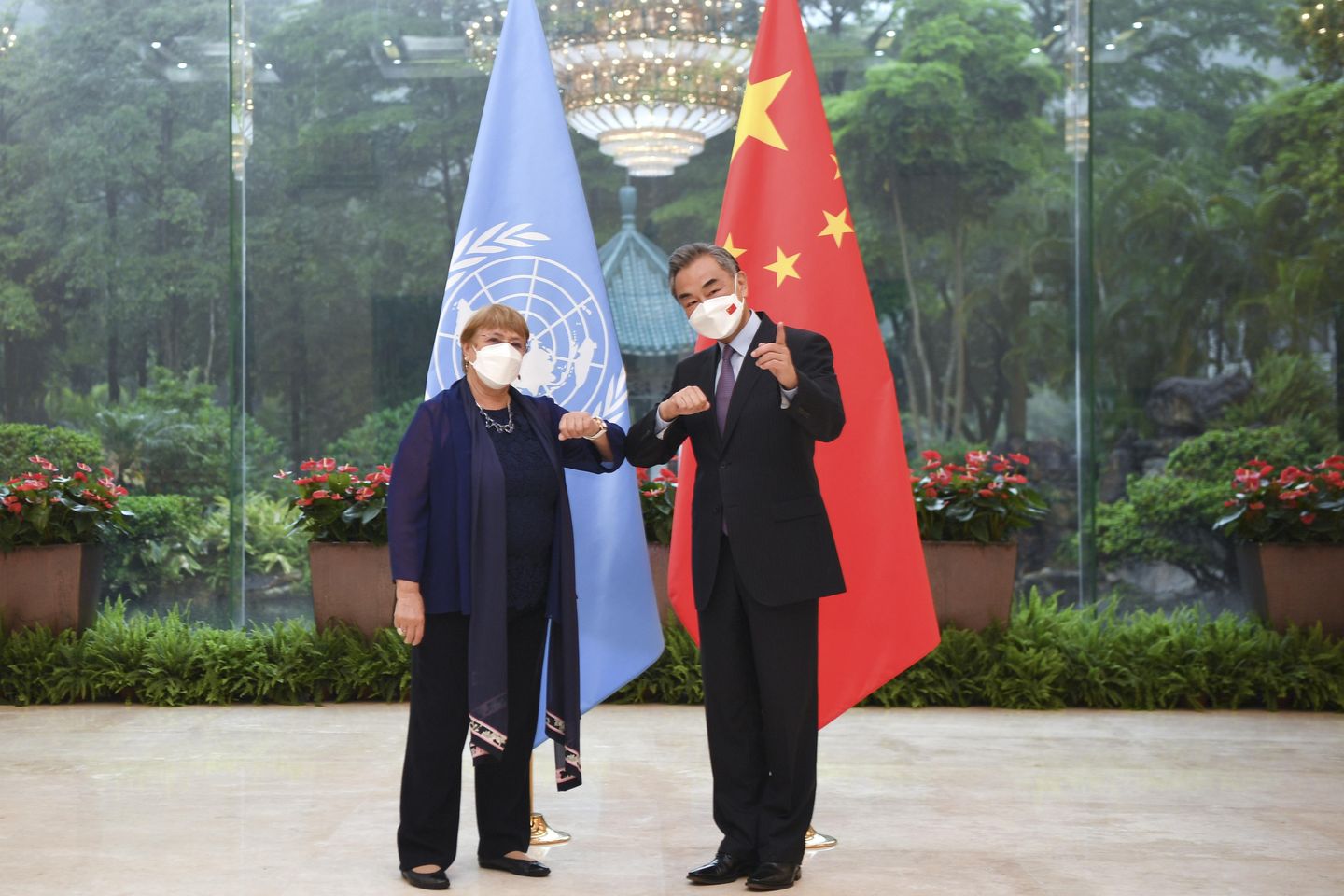

The Biden administration accused China over the weekend of trying to “restrict and manipulate” a visit to the country by the United Nations’ top human rights official as part of an effort by Beijing to hide evidence of its genocide against Uyghurs and other predominantly Muslim ethnic minorities.
“We are concerned the conditions Beijing authorities imposed on the visit did not enable a complete and independent assessment of the human rights environment in [China],” Secretary of State Antony Blinken said in a statement referencing U.N. High Commissioner for Human Rights Michelle Bachelet‘s trip that ended Saturday.
Mr. Blinken expressed distress over the situation in China‘s northwestern Xinjiang province, where he said “genocide and crimes against humanity are ongoing” and suggested Ms. Bachelet and her team were blocked from carrying out a full assessment in the province.
The secretary of state’s comments were circulated Saturday night after Ms. Bachelet, a Chilean politician who has served in her U.N. post since 2018, made headlines by announcing she raised concerns with Chinese officials during her visit about Beijing‘s broad application of counterterrorism and deradicalization measures against Uyghurs and others in Xinjiang.
Ms. Bachelet, who visited Xinjiang as part of a six-day trip, said the visit was not an investigation but a chance to raise concerns with senior leaders and pave the way for more regular interactions to support China in fulfilling its obligations under international human rights law.
“It provides an opportunity for me to better understand the situation in China, but also for the authorities in China to better understand our concerns and to potentially rethink policies that we believe may impact negatively on human rights,” she said in a video news conference before leaving China.
SEE ALSO: Justice Department announces review of police response to Texas school shooting
Her measured words triggered frustration in Washington, where Republicans and Democrats had been critical of her decision to visit Xinjiang to begin with, saying the trip may give Chinese authorities a chance to spread misinformation.
U.S. officials and human rights activists also warned ahead of the trip that Chinese authorities would attempt to control what Ms. Bachelet and her team saw.
Mr. Blinken reiterated that concern over the weekend, asserting that State Department officials were “troubled by reports that residents of Xinjiang were warned not to complain or speak openly about conditions in the region, [and] that no insight was provided into the whereabouts of hundreds of missing Uyghurs.”
The secretary of state pointed to “new reports that offer further proof of arbitrary detentions among the more than one million people detained in Xinjiang.”
“Survivors and family members of detainees have described cruel treatment that shocks the conscience, including torture, forced sterilization, state-sponsored forced labor, sexual violence, and forced separation of children from their parents,” Mr. Blinken said.
“The High Commissioner should have been allowed confidential meetings with family members of Uyghur and other ethnic minority diaspora communities in Xinjiang who are not in detention facilities but are forbidden from traveling out of the region,” he said. “We also note that the High Commissioner was not allowed access to individuals who were part of the Xinjiang labor transfer program and have been sent to other provinces across China.”
SEE ALSO: Judge rejects Trump’s lawsuit to block New York Attorney General probe
Ms. Bachelet, making the first visit by a U.N. high commissioner for human rights to China in 17 years, said she raised the lack of independent judicial oversight for a system of internment camps for Uyghurs being operated by Chinese authorities.
China’s ruling Communist Party, which vehemently denies all reports of human rights violations and genocide in Xinjiang, has described the camps as vocational training and education centers to combat extremism, and says they have been closed. Beijing has never publicly said how many people passed through the camps.
In a statement over the weekend on Ms. Bachelet‘s visit, Chinese Vice Foreign Minister Ma Zhaoxu, accused some Western countries of fabricating lies about Xinjiang under the guise of human rights. The statement said the government had adopted lawful measures to combat violent terrorism and brought security, stability and prosperity to the region in China’s northwest.
“The Chinese side pointed out that essentially, Xinjiang is not at all a human rights issue, but a major issue concerning upholding national sovereignty, security and territorial integrity,” it said. “All ethnic groups of Xinjiang belong to the family of the Chinese nation.”
Agnes Callamard, the secretary general of Amnesty International, said Ms. Bachelet should condemn human rights violations in Xinjiang, call on China to release people arbitrarily detained and end systematic attacks on ethnic minorities in the region.
“The high commissioner’s visit has been characterized by photo opportunities with senior government officials and manipulation of her statements by Chinese state media, leaving an impression that she has walked straight into a highly predictable propaganda exercise for the Chinese government,” Ms. Callamard said in a news release.
• This article is based in part on wire service reports.
